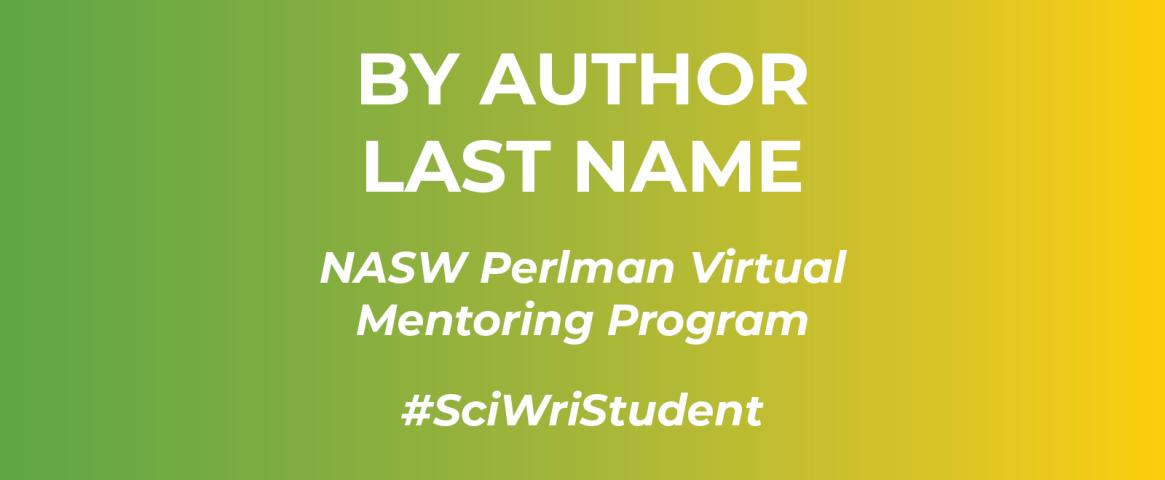Published on NASW.org:
Answers to memory loss might just lie in stories
By Nicolas Scrutton Alvarado, mentored and edited by Eric Bender
High-tech bionic hand gives amputee unprecedented finger control
By Tammy Awtry, mentored and edited by Melissae Stuart
Scientists must win back the trust of Americans post pandemic
By Emely Bonilla, mentored and edited by Robin Marantz Henig
Disadvantaged, polluted neighborhoods increase the risk of depression in children and adolescents
By John Carlo Jadormeo Combista, mentored and edited by Mark Shwartz
Open insulin and the potential of synthetic biology
By Asha Dees, mentored and edited by Josh Baxt
Whales still face numerous threats in the Gulf of Mexico. Could a new endangered species change that?
By Emma Dennes, mentored and edited by Christina Nunez
From code to cure: how AI is revolutionizing drug discovery
By Alex Dong, mentored and edited by Tom Abate
Timing hormone therapy with menopause onset does not increase Alzheimer’s risk — but early menopause might
By Caleigh Findley, mentored and edited by Michael E. Newman
Monkey Sounds May Provide Clues to Our Emotional Origins
By Mia Gawith, mentored and edited by Sarah Webb
Go with your gut: this bacterium might be hiding in your stomach
By Madeleine Harris, mentored by Barbara Gastel and edited by Eli Kintisch
Fighting cystic fibrosis with CRISPR
By Isabella Hetherington, mentored and edited by Elizabeth Preston
AI can fake entire scientific papers. What does this mean for scholarly publishing?
By Jenna Jakubisin, mentored and edited by Shaun Kirby
Emerging technology incorporates AI-modeling to identify heat tolerant corals with hope for bleaching reefs
By Hannah Kania, mentored and edited by Esther Landhuis
DIY: sunscreen — using melanin in the making of “ultra-protective” sunscreen
By Sofia Lebron, mentored and edited by Jan Greene
Canadian wildfires illuminate health disparities in low-income neighborhoods — in Chicago
By Sarah Mahaney, mentored and edited by Shel Evergreen
Old mouse brains can still take out the trash, a new study shows
By Joe McMillan, mentored and edited by Bethany Brookshire
Im-PECK-able adaptation: some city birds construct nests out of anti-bird spikes
By Paige Nicklas, mentored and edited by Jennifer Carr
Rhapsody in blue soup – how the blue soup saga captivated Twitter
By Christina Nowicki, mentored and edited by Haley Wasserman
Here's why we fall for deception, and what we can do about it
By Abdulrahman Olagunju, mentored and edited by Maureen O'Hagan
How extreme heat inflames a historically polluted community
By Jordyn Pykon, mentored and edited by Maddie Bender
Ancient immune cells help mice evade dodgy food
By Mahathi Ramaswamy, mentored and edited by Ranjini Raghunath
Precision prescribing for colon cancer based on gut microbes
By Tanner G. Richie, mentored and edited by Emily Caldwell
UC San Diego’s expanded on-campus surveillance raises privacy and retaliation concerns
By Fayth Tan, mentored and edited by Kathiann M. Kowalski
Astronomers uncover magnetic anomalies with potential implications for stellar evolution
By Elizabeth Watson, mentored and edited by Kendra Redmond
Plastic-ridden plankton are poisoning gray whales
By Mackenzie White, mentored and edited by Saima Sidik
Anolis lizards show unlikely adaptations to urban environments, study finds
By Hanwen Zhang, mentored and edited by Laura Dattaro
Published elsewhere:
Biodegradable Sensors Could Explore the Seas More Sustainably
By Lisa Aubry, mentored and edited by Katherine Kornei
American Geophysical Union / Eos
Bird-friendly maple syrup boosts Vermont forest diversity & resilience
By Nina Foster, mentored and edited by Lesley Evans Ogden
Monga Bay
Astronomers find stars cast away from galactic neighbors
By Katya Gozman, mentored and edited by Erika Carlson
Sky & Telescope
The Dark Side of Involuntary Hospitalization
By Elizabeth Lin, mentored and edited by Elizabeth Whittington
The Xylom
Why Do We Dream? Maybe to Ensure We Can Literally ‘See’ the World Upon Awakening
By Roberta McLain, mentored and edited by Monya Baker
Scientific American
Cats Can Hide Their Pain — But Not from AI
By Leila Okahata, mentored and edited by Eric Bender
Scientific American
A Good Night’s Sleep May Help Control Blood Sugar
By Siddhant Pusdekar, mentored by Mark Roth and edited by Lauren Young
Scientific American
Dust Is Melting Snow — And Current Models Can’t Keep Up
By Kara West, mentored and edited by Jill Sakai
American Geophysical Union / Eos

